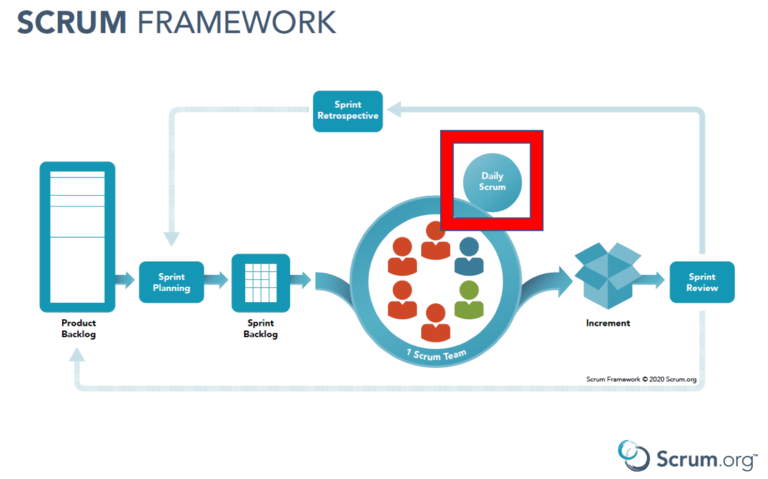The Daily Scrum

Let us have a look how the Scrum Guide defines ‘Daily Scrum’
‘The purpose of the Daily Scrum is to inspect progress toward the Sprint Goal and adapt the Sprint Backlog as necessary, adjusting the upcoming planned work.’
That is it, that is the definition of the ‘Daily Scrum’, it has a very simple and clear purpose which is to inspect and adapt the progress to the sprint goal.
The benefits of the Daily Scrum, it helps improve communications, identify impediments, promote quick decision-making, and consequently eliminate the need for other meetings.
The scrum guide also defines some rules about the ‘Daily Scrum’:
- The Daily Scrum has a time box of 15-minute regardless of the sprint length
- The Daily Scrum is an event for the Developers by the Developers
- If the Product Owner or Scrum Master are actively working on items in the Sprint Backlog, they participate as Developers.
In terms of the structure of the Daily Scrum, the scrum guide does not offer guidance on how to run the event allow the Developers to select whatever structure and techniques they want, as long as their Daily Scrum focuses on progress toward the Sprint Goal and produces an actionable plan for the next day of work.
This accountability helps creates focus and improves self-management as the developers own the action and the plan to address those actions.
What About The Three Questions?
The three-question format is a common way to structure the Daily Scrum, but it’s not a requirement. The 2020 Scrum guide updated removed the suggested three question format was removed. The Scrum guide now says that “the Developers can select whatever structure and techniques they want, as long as their Daily Scrum focuses on progress toward the Sprint Goal and produces an actionable plan for the next day of work. This creates focus and improves self-management”.
The purpose of these changes was to emphasize the values and principles of Scrum and give Scrum teams more flexibility to adapt the framework to their specific context. The Scrum Guide 2020 update focuses more on the underlying principles of Scrum, rather than just the practices, and encourages teams to be self-manage and adaptive in their approach.
